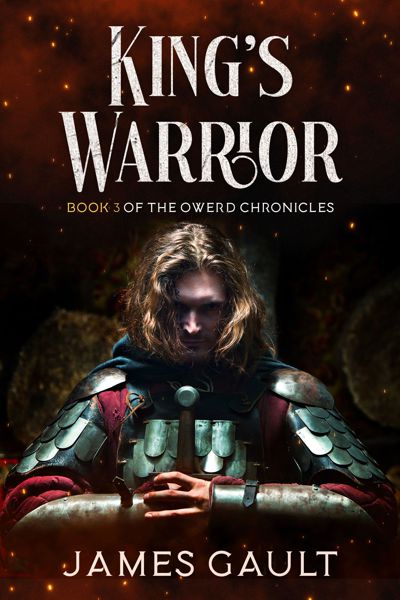
In 11th Century England, King William has achieved almost total domination of the Englisc and turns his attention to Scotland. Owerd, possibly the last of the Britons to be deemed ‘lord’, faces powerful enemies from all quarters. He seems to hold the king’s favour by a thread, which only serves to encourage others to try and bring him down.
Treachery abounds as he tries to juggle multiple roles and prove himself and his men worthy warriors for the Norman king. But will his lust for a woman finally prove his undoing?
Note from the author:
11th Century men and women were just as complex beings as we are today. Owerd, the main character in these chronicles is no different. In “King’s Warrior”, the third book of the series, he goes from violence (“…the air was filled with the clash of swords, angry shouts, and screams of the injured”) to compassion (“… Owerd had rarely, if ever, made love as tenderly as he did with Runa that night”) in the space of a day.
Happiness, fear, disgust, anger, pride and jealousy all play their part in Owerd’s character but what comes to the fore is courage, with perhaps a helping hand from fate – “wyrd” if you will.

Guest Post: Background
“King’s Warrior” is the third in a series about Owerd, a decent but unsophisticated 11th century Briton who has struggled out of poverty by dint of courage and good fortune (“wyrd” if you will). The series came about by accident, initially intended as a single volume to bring Charles Kingsley’s classic novel “Hereward the Wake” into a more digestible form for the contemporary reader. That attempt proved impossible – one cannot, I found, tinker with a classic, however challenging its rather antiquated prose. Hence a new character set in the same period of a land beset by inequity, strife and a Norman invasion. In this book Owerd, having already established his credentials as a loyal subject and “Sea Lord”, returns to the role he fills best, that of warrior.
The events of 1066 are widely known and this book of the Owerd tale is set in their aftermath when the hurriedly crowned William I has largely, and often with great cruelty, established his domination over his new Anglo-Saxon subjects. That is not to say his tenure on the crown was then secure. Northumbria and Scotland to the north, Wales to the west and Denmark across the ‘narrow sea’ all presented threats in various forms. “King’s Warrior” is set in the period when the Northumbrians had been cowed by the ‘harrowing of the north’; measures were well in place to protect the Welsh border; and King Sweyn of Denmark had been, at least temporarily, paid off. That left the threat from Scotland, and in particular the evident support there for his only personal rival for the crown, Edgar the Atheling, grandson of Edmund II and accepted as the last living member of the Anglo-Saxon royal line.
Normandy, itself a product of Viking predations into France, incurred further threats to its borders in William’s time as its Duke. He was thus accustomed to forcefully securing the Duchy’s borders and conscious of the need to do so for his new territory. Intelligence about King Malcom of Scotland not only encouraging, or at least turning a blind eye, to raids into northern England but also hosting Edgar the Atheling and several rebel English nobles was undoubtably cause for concern.
I have taken a relatively harsh view of the Norman character but a relatively benign depiction of William himself. He was variously perceived as ruthless, cruel, religious and merciful. A dominant feature, though was of authoritarianism. His rule was autocratic and all authority derived from him and him alone. The formal linkage of King Malcom to Edgar by the former’s marriage to Edgar’s sister Margaret and the (at least implied) support for Edgar’s claim to the English throne was an outright challenge that King William was not the sort of man to ignore. Added to that was the knowledge that Edgar had been seeking alliance with the Danish King Sweyn II, and probably would do so again. In combination, that presented an ongoing threat that no ruler of William’s character could countenance.
The Anglo-Saxon Chronicle attests that “King William led a naval force and a land force to Scotland … and beset the land”. “King’s Warrior” adds a touch of largely imagined meat to that simple statement.
This title is available to read on #KindleUnlimited.
Universal Link: https://books2read.com/u/4A27gp
Amazon UK: https://www.amazon.co.uk/gp/product/B0CC5VH6BM
Amazon US: https://www.amazon.com/gp/product/B0CC5VH6BM
Amazon AU: https://www.amazon.com.au/gp/product/B0CC5VH6BM
Amazon CA: https://www.amazon.ca/gp/product/B0CC5VH6BM
Meet James Gault

James is a semi-retired Naval Captain with an abiding interest in storytelling and history. He has written a few contemporary fiction stories and a history text but lately has concentrated on historical fiction. He lives in a small coastal town in SE Australia – which provides quite a challenge when addressing medieval England with the aid of an old school atlas.
Connect with James
Twitter: https://twitter.com/@ozjimg
Facebook: https://www.facebook.com/james.gault.9421/
Instagram: https://www.instagram.com/ozjimg/
Amazon Author Page: https://www.amazon.com/author/jgault
